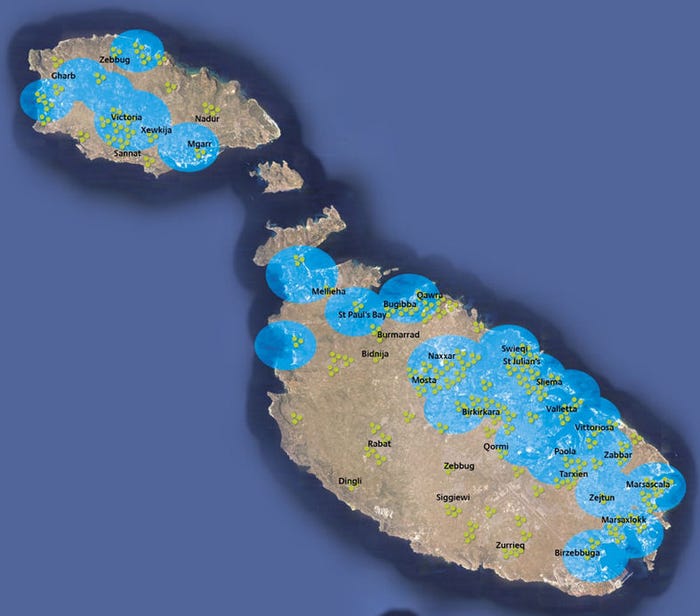Melita CEO Andrei Torriani on the challenges faced by today’s operators
Telco consolidation seems to be an accelerating current trend, nowhere more so than in Europe, and it’s easy to see a future where markets will be served by a small number of players all offering the full multiplay bundle of voice, data and content.
July 2, 2015

Telco consolidation seems to be an accelerating current trend, nowhere more so than in Europe, and it’s easy to see a future where markets will be served by a small number of players all offering the full multiplay bundle of voice, data and content.
One of the challenges this will create is how to differentiate, especially if they want to control their spending on infrastructure, content and marketing. To get some ideas on how to go about this, as well as insight into the challenges involved, Telecoms.com spoke to Andrei Torriani (pictured), CEO of Maltese operator Melita, who explained that his company is in a privileged position when it comes to exploring new business models.
 “Malta is in a way the testing ground for a lot of the paradigm shifts that are happening in telecommunications,” said Torriani. “We’re moving from a model centred around voice, where data was a secondary service and video was separate.
“Malta is in a way the testing ground for a lot of the paradigm shifts that are happening in telecommunications,” said Torriani. “We’re moving from a model centred around voice, where data was a secondary service and video was separate.
“The old paradigm was very much driven by the vendors and operators, and the products that some operators offer today are still dictated by that. Now the industry is moving over to IP centricity and voice is increasingly a secondary service, whether it’s driven by flat-rate offerings on mobile networks or over-the-top services like Skype or any of the other that have made it essentially free. The operator has to take a step back in light of this shift, really understand its role as an enabler, and stop trying to control all the traditional aspects they have tried to control.”
That’s easier said than done, however. Operators have been aware of threats such as OTTs and declining ARPUs for some time, but recent history is littered with failed attempts by operator to shake things up a bit. So we asked Torriani about his own company’s experiences in that area.
“We took new view five or six years ago, driven by the fact that our own paradigm of control was shaken,” he said. “At one time we offered premium content such as sports, but the pricing escalated as our competitors increased, and we decided that instead of tying our identity to an asset that we couldn’t count on we should invest in where we see this industry going, which is this IP centricity.
“So we upgraded our network to DOCSIS 3.0 and rolled out a portfolio of broadband speeds. On top of that we decided to be more innovative and roll out a seamless ecosystem utilising the same modems that we were installing for broadband customers.
“60% of our installed base today has what we call ‘Melita wifi’ modems. The Melita wifi is a mesh network delivered via a separate channel on the modem, which allows our customers to access this wifi mesh network throughout Malta without having to log in again after the first time. So anywhere you walk in main streets of the capital Valetta you’ll have seamless coverage and you can go for a run along the coastline listening to streaming music over wifi continuously.”

This mesh of wifi hotspots is not an unfamiliar concept, but it has proven a difficult trick to pull off. With the natural geographic constraints that come with serving a relatively small island, Melita has been able to provide an acceptable level of mobile coverage using primarily wifi, supplemented by 3G. One of the main challenges of such a move is consumer acceptance.
“Initially there was some consumer education to do, just as there was in the States and UK, but they’re separate channels so there’s no way somebody on the Melita wifi network can access your service and they’re not taking any of your speed,” said Torriani.
“We launched the pilot in 2013 and we started building it out commercially in 2014. The data that goes through the Melita mesh network now exceeds that of the 3G network and double per user. Over 30% of users use more than 1GB per month. We offer our customers 10GB of bundled data on the Melita wifi network as part of our core mobile broadband bundle. They may pay a little more with us, but they get a lot more for their money.”
And Torriani insists there are other business benefits too. “We’re seeing great benefits ourselves,” he said. “From a capex perspective we’ve calculated that the wifi mesh network is ten times more cost effective than carrying that traffic on our 3G network – it’s more cost effective from a deployment and a backhaul standpoint.
“There’s a lot of talk about LTE-U right now and we don’t see the need to rush into LTE until those standards are ready, which we believe will be in 2016. We’re committed to go to LTE, but the fact that we’re implementing a wifi mesh network makes it a very different investment scenario than if we’d rushed into LTE and tried to cover the nation, relying on the traditional network vendors and their expensive picocell and microcell solutions.
“Every time one of these new standards comes out it’s a seven year cycle that fits the business models of the traditional vendors very well. From an operator perspective you not only need to go out and build the networks, which is very capex intensive, but also go through this handset subsidy model, and operators are starting to question the need for this.”
One of the problems the smartphone era has created for operators is one of control. Once phones were given full and easy internet access the so-called OTT players were able to take the customer relationship away from operators. This, in turn, has affected consumer expectations of what they should reasonably be expected to pay for.
“We compete against Vodafone here, and it’s having a bit of a PR issue now because consumers are starting to realise that when you use a 4G service you use a lot more data and bills start going up,” said Torriani. Traditionally operators very much viewed the world as either mobile or fixed. In many of their mindsets convergence is still about bundling, but from a consumer standpoint convergence is increasingly about having multiple choices way beyond the traditional controlled telco paradigm of what consumers can and cannot have.”
We concluded by looking to the future, and asked Torriani how he sees these trends playing out. “I think it’s going to come down to a competitive environment of two to three players in each market, who have the capability of offering ecosystems where fixed and mobile are increasingly converged, and pricing will become more data centric while voice becomes a flat-rate commodity,” he said.
“Content is a very fickle asset; look at what’s happening in North America with Verizon trying to deliver more of what customers want in terms of being able to choose the content within their bundle. Increasingly operators are saying the current content model is unsustainable unless the operator actually owns production.
“If you look at what’s happening in the EU is saying you can’t geographically restrict people, so there should be nothing to prevent someone in Malta, the UK or wherever from watching football streamed to a device for a subscription they pay in another market. Content providers don’t want this because they make millions on geographic divide and conquer and this is another thing driving consolidation.
“So it’s going to come down to who is best positioned to deliver the ecosystem and facilitate this, from a CRM and billing standpoint, in a very cost-effective way. And capture the fact that IT delivered services generally have much higher margins than traditional telco ones.
“We’re owned by private equity and I think we could not have taken the vision we did five or six years ago if we were in a publicly listed company, looking month to month., and living under the delusion that we could continue to drive the traditional telco model based on subscription growth. If you want to reduce churn you need to put control into the hands of consumers.”
Andrei Torriani will be speaking at Broadband World Forum 2015 in London

Read more about:
DiscussionAbout the Author(s)
You May Also Like











_1.jpg?width=700&auto=webp&quality=80&disable=upscale)


.png?width=800&auto=webp&quality=80&disable=upscale)